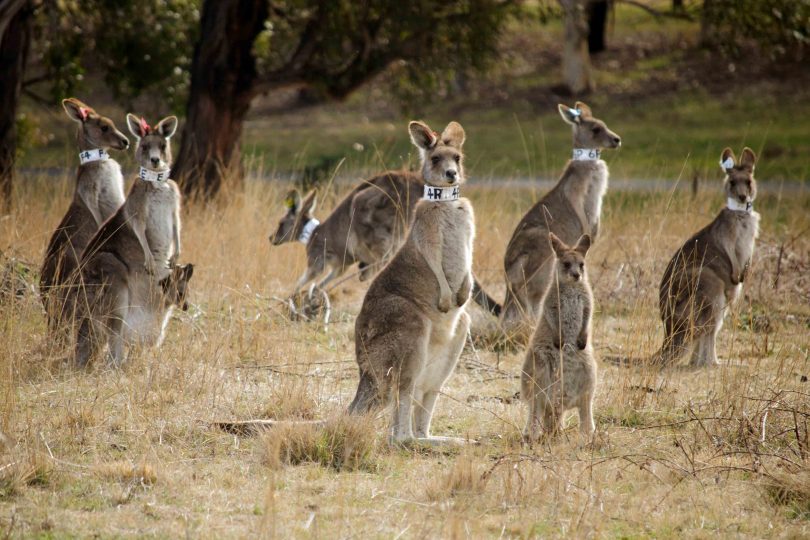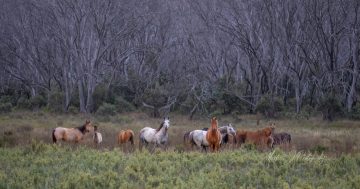
Collared kangaroos in the ACT prior to fertility control treatment. Photo: File.
A US proposal to ban the import and sale of kangaroo products used in the manufacture of football boots has been described as one of the most comprehensive own goals in the history of improving the iconic Australian marsupial’s welfare.
Canberra’s George Wilson, an Honorary Professor at the ANU, and
If the proposed bill in the US Congress succeeds, they say a ban would further suppress global demand for kangaroo products and allow unregulated, uncontrolled and unmonitored killing by amateur hunters to flourish, as well as risk mass starvation of the animals in drought conditions.
The article comes as the ACT prepares for its annual kangaroo cull which usually comes under fire from a small but vocal contingent of animal rights activists, who in the past have mounted protests in the field and tried to disrupt the shooting program.
The ACT Government last year awarded five-year $880,000 contract for shooters to humanely cull kangaroos in the Territory’s nature parks and reserves to ease grazing pressures and protect grassland species and habitats.
It is also pursuing fertility control methods.
But the cull has also been criticised for wasting the meat and skins of shot kangaroos, whose carcasses are buried.
Professor Wilson and Dr Read argue that the kangaroos, which now number more than 40 million, are far from threatened species and have flourished since the advent of white settlement due to greater availability of pasture, increased watering points, dingo control and less Indigenous hunting.
Under tightly controlled quotas, just 1.6 million kangaroos, or about 3.7 per cent of the population, were harvested in 2019.
Landholders trying to protect pastures take matters into their own hands using amateur shooters that do not adhere to any code of practice and poison. The pair’s research shows more kangaroos are killed this way than in the commercial harvest.
“Overabundance can also affect the welfare of the animals themselves. During the recent drought, for example, millions of kangaroos starved and breeding was suppressed, causing kangaroo numbers to fall markedly,” they argue.
It would be better if a properly regulated industry was encouraged that placed a value on each animal so they became an asset rather than pest to farmers, they say.
“We believe an alternative vision is required – one in which consumer demand for kangaroo products increases.”
“Landholders would then consider kangaroos, including the young, valuable rather than pests – creating a form of custodianship and an incentive to integrate kangaroos with other farm enterprises. This would lead to more effective management and animal welfare outcomes.”
They said soft-footed kangaroos cause less damage to soils than hard-hooved introduced livestock, and farmers could earn carbon credits through better management of grazing pressures and substituting high-emission meat and leather for kangaroo alternatives.
Government should promote the positive benefits of kangaroo products to increased their demand, emphasising the health attributes of kangaroo meat, the quality of the leather and the ethical advantages of field harvesting, they said.
“We urge the Federal Government to show leadership and work with the states to improve kangaroo management. Doing so would seem a great project for the Future Drought Fund.
“A stronger kangaroo industry integrated with the other red meat industries, delivering high-value products, is possible.”
Original Article published by Ian Bushnell on The RiotACT.








